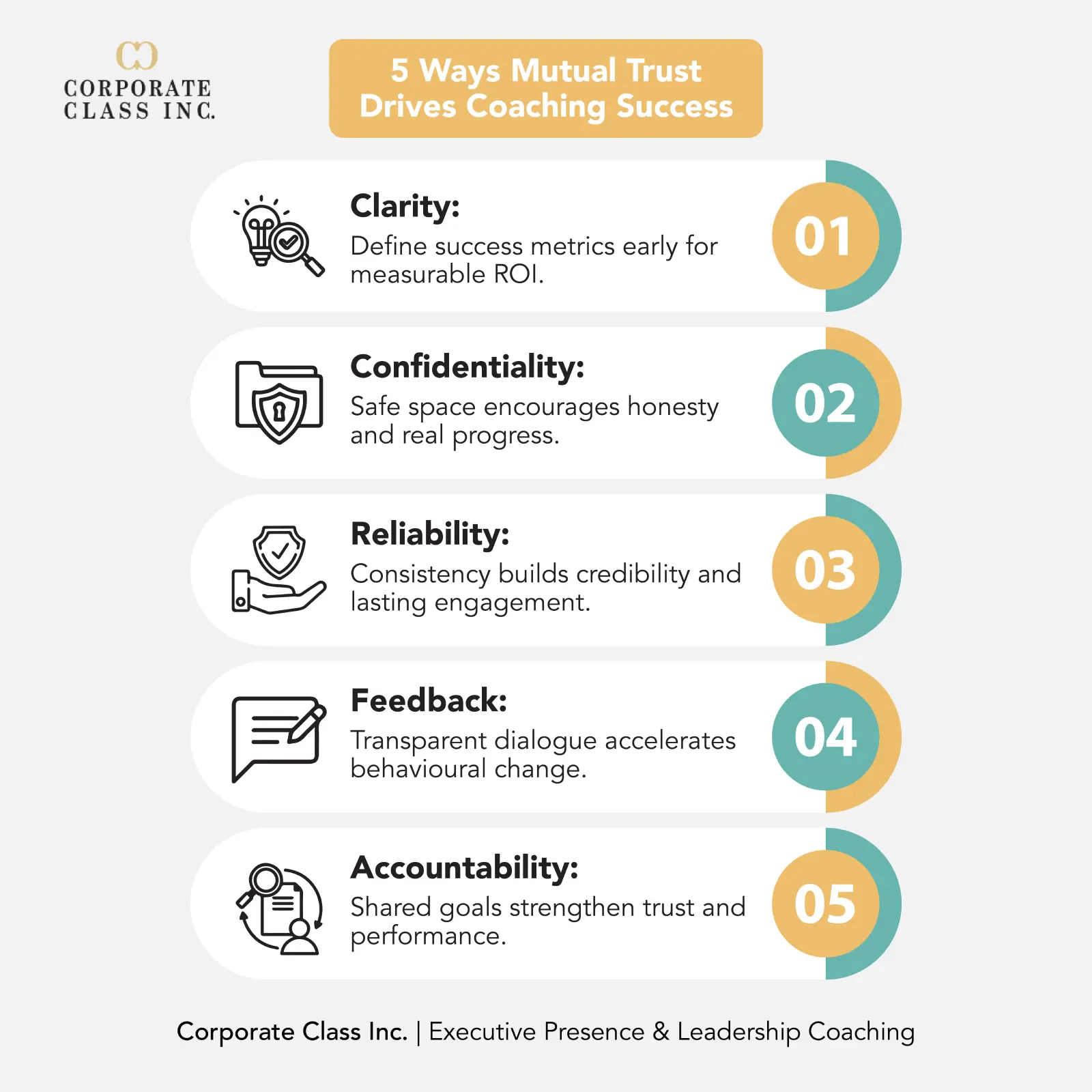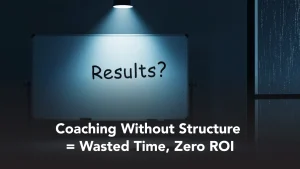Mutual Trust in executive coaching means more than comfort between a leader and a coach. It is a structured, performance-driven exchange where credibility, confidentiality, and collaboration work together to achieve results. When both parties show reliability and consistency, coaching sessions shift from conversations to measurable progress. Every insight becomes actionable, every session productive, and every commitment sustainable. This article explores how trust creates the foundation for ROI, behavioral transformation, and long-term leadership excellence.
Key Takeaways
- Mutual Trust drives measurable coaching ROI by improving accountability and commitment from both the coach and leader.
- Early trust-building accelerates leadership growth, creating transparency and psychological safety.
- Erosion of trust directly impacts behavioral change, performance consistency, and partnership longevity.
Earning Trust Quickly: Strategies Coaches Use with High-Performing Leaders
High-performing leaders expect precision, privacy, and results. To earn their trust, coaches must demonstrate credibility from the first conversation. Trust is established through respect for time, depth of insight, and sensitivity toward executive pressure. Every interaction becomes an opportunity to prove reliability and alignment.
Experienced coaches use structured listening and tactical questioning to understand a leader’s motives and constraints. Instead of offering generic advice, they create a personalized framework that mirrors the leader’s business context. This signals commitment to outcomes, not opinions. Coaches also maintain consistent communication patterns that reassure reliability through every touchpoint.
Trust also grows when a coach practices discretion and neutrality. High-level executives operate in environments where information control defines influence. A coach who safeguards those discussions builds long-term confidence. Over time, this psychological safety translates into honest reflection, self-correction, and accelerated growth.
Maximizing Coaching ROI by Building Mutual Trust from the Start

Return on investment in coaching depends heavily on the foundation of trust built during the first few sessions. Without it, leaders often hesitate to share real challenges or provide honest feedback, leading to surface-level discussions that limit growth. Mutual Trust accelerates openness, allowing deeper insights and faster alignment between leadership goals and behavioral execution.
When trust is intentionally prioritized, both sides contribute to measurable success. The leader feels supported, the coach operates with credibility, and both maintain clarity on outcomes. Building trust is not a single act; it is an ongoing practice rooted in shared responsibility and transparency.
The following principles create a high-trust foundation that maximizes the return on coaching investments:
- Define success metrics early: Establish quantifiable objectives, such as improved team engagement, decision-making efficiency, or revenue influence, to guide consistent evaluation. Clear metrics align expectations and create tangible milestones for both leader and coach.
- Commit to confidentiality: Confidential discussions create a protected zone where executives can process sensitive issues freely. That privacy strengthens authenticity and helps leaders address high-stakes challenges without fear of exposure.
- Demonstrate reliability: Following through on commitments and maintaining consistent communication establishes predictability. Reliability builds professional respect and assures leaders that progress will continue regardless of external pressures.
- Share honest feedback: Transparent dialogue transforms sessions into performance accelerators. Constructive, well-timed feedback shows commitment to real improvement instead of superficial validation.
- Align coaching style to leader personality: Adapting tone, pacing, and focus based on individual preference reinforces respect and strengthens confidence.
Recognizing Red Flags: When Mutual Trust Begins to Erode
Even strong coaching partnerships can lose traction when Mutual Trust starts to weaken. Small cracks, missed commitments, inconsistent communication, or unspoken expectations can quickly grow into performance gaps. Recognizing early signals allows coaches and leaders to repair trust before it impacts results.
Erosion typically shows through behavioral shifts and emotional disengagement. The coach may sense withdrawal or defensiveness, while the leader might start questioning value or credibility. Awareness and action at this stage protect both progress and partnership integrity.
Key indicators that trust may be weakening include:
- Avoided conversations: When certain topics suddenly become off-limits, openness has diminished and psychological safety has been compromised.
- Decline in follow-through: Missed action items and delayed responses often point to waning confidence or shifting priorities.
- Lack of reflection: Short, surface-level participation signals mental fatigue or emotional withdrawal from the coaching process.
- Defensiveness to feedback: Growing tension or reactive responses suggest insecurity or loss of faith in the coach’s intent.
- Reduced enthusiasm: A noticeable dip in engagement during sessions can indicate that the leader no longer feels fully invested.
Addressing these issues requires immediate realignment. Coaches should revisit expectations, reinforce transparency, and invite open dialogue around what has changed. By tackling the issue directly, both sides demonstrate maturity and accountability, restoring trust before it impacts measurable outcomes.
Linking Trust Directly to Lasting Behavioural Change in Coaching
Lasting behavioral change depends on the quality of trust between coach and leader. When accountability grows within a trusted environment, leaders become more willing to test new approaches and challenge their patterns. They internalize lessons faster and sustain them longer because change feels collaborative, not imposed.
The science of behavioral transformation shows that emotional safety enhances learning retention. Leaders adapt when they believe their coach genuinely supports their success. Trust gives them the confidence to fail safely, reflect deeply, and improve continually.
Here are key mechanisms linking trust to sustained behavioral improvement:
- Active experimentation: Leaders engage more freely in new behaviors when they trust that outcomes will be assessed fairly. They learn through experience rather than theory.
- Continuous reflection: Trusted relationships promote honest debriefs that identify success patterns and areas for refinement. This reflection turns experience into expertise.
- Reinforced accountability: Shared ownership of goals makes progress measurable and collective. Accountability becomes a mutual standard, not a top-down demand.
- Emotional resilience: Secure trust helps leaders manage critical feedback with composure. They focus on improvement instead of self-protection.
- Positive reinforcement: Trust allows both coach and leader to celebrate small wins that strengthen confidence and momentum.
When Mutual Trust becomes the underlying current of every coaching engagement, behavioral change stops being temporary. It becomes a repeatable process, one that empowers leaders to continue improving long after the coaching relationship concludes.
Creating Enduring Coaching Partnerships Rooted in Mutual Trust
Sustained coaching success depends on the consistent renewal of Mutual Trust. As leaders evolve, expectations shift, and goals mature. Maintaining trust through transparency and alignment ensures continued relevance and measurable impact. Every renewal of commitment strengthens the partnership’s value.
Enduring relationships require equal investment from both parties. Coaches must remain objective and adaptable, while leaders must stay engaged and communicative. This shared accountability transforms coaching from a short-term engagement into an evolving professional alliance.
- Periodic check-ins: Regular reviews maintain alignment with changing business and personal priorities.
- Co-created goals: Shared ownership reinforces collaboration and long-term motivation.
- Respect for boundaries: Healthy limits protect professionalism and prevent over-dependency.
- Evidence-based outcomes: Regular measurement validates ROI and ensures transparency.
FAQ
How does Mutual Trust affect executive coaching outcomes?
Mutual Trust determines the depth and pace of progress. When leaders and coaches share transparency, feedback becomes honest and actionable. The result is faster behavioral adaptation and higher ROI on coaching investments.
Can trust be rebuilt once it is lost during coaching?
Yes, rebuilding is possible when both acknowledge the breach and recommit to clarity. Reaffirming confidentiality, revisiting goals, and establishing new communication norms help restore credibility. It requires consistent effort and genuine accountability from both sides.
Why is Mutual Trust critical for behavioral change?
Behavioral change relies on psychological safety. Without trust, leaders hesitate to experiment or reflect truthfully. Trust transforms vulnerability into growth and turns feedback into fuel for sustained performance.
Sustaining Growth Through Mutual Trust
Building trust is not an emotional exercise; it is a strategic choice that determines coaching success. When you invest in it deliberately, every session delivers measurable progress, and every insight turns into action. Mutual Trust strengthens accountability, consistency, and confidence, the three pillars of executive growth. Build it early, protect it fiercely, and you will see leadership excellence evolve into lasting organizational impact.





